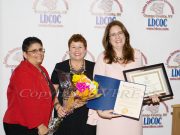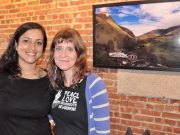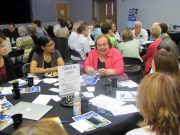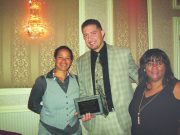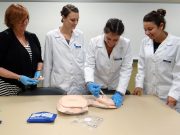Women in the wild west didn’t have it so good.
Sexual assault ran rampant in the Old West, as career options for women were split evenly between being a teacher, a nurse or a prostitute. The number of rapes that went unreported or unprosecuted back then aren’t much different than today, according to one expert.
“In the last 150 years, we’ve gone from the steam engine to the jet engine, from horses to Lear jets and from outhouses to gold-plated indoor plumbing, yet the progress women have made in defending against sexual assault really hasn’t matched the pace of technology,” said Nancy Williams, a veteran staffer of a women’s crisis center and author of Hawkmoon, a historical novel about a rape survivor in the Old West. “According to the U.S. Justice Department, more than 20 percent of all women today report they’ve been sexually assaulted at least once in their lives, while only one in 10 rapes is ever actually reported to law enforcement.”
Williams believes that it’s as difficult today to prosecute an attacker as it was in the frontier days.
“Back then, women didn’t report rape, because they knew their attackers would never be pursued,” she said. “Today women don’t report it because their attacker is typically someone they know – 76 percent according to the DOJ – or because of what they have to go through in order to gather evidence and help the prosecution build a case good enough to win a conviction.”
The most daunting barrier, however, is the culture of silence in the community of assault victims.
“We send young women mixed messages,” she added. “Women are trained not to talk about anything regarding their sexuality in polite society. Yet, when it comes to something as graphic as rape, they now have to tell a long line of strangers, including the police, the prosecutors, the attorneys, the judge, the jury and their families about every intimate detail of it in order to get justice. Evidence collection often involves performing a rape kit, which can feel just as violating as the rape itself. Most women in those situations aren’t only interested in justice – they want to heal. The true course to healing starts with talking about it, and getting justice for their attackers.”
Williams said she wished she could reach every victim she could with the following messages:
• It’s not your fault. Rape is not about desire. It’s a crime of power and control, and the fault for it taking place is solely with the attacker.
• What’s happening to you is not “normal”. Many abusers were once abused themselves, and believe that abuse is a normal part of human relationships. It isn’t; you don’t need to live with it.
• You are not alone. One in five women say they’ve been assaulted at some point in their lives, so you are not alone in your suffering, and many past victims have become counselors themselves.
• You are loveable and powerful – You were not raped because you are worthless. You are loveable and powerful, and you are worth fighting for, but you have to first want to fight for yourself.
“The numbers are scary; even scarier are the stories victims tell,” Williams said. “If we are going to have a chance at reducing those statistics, and showing some real progress in a society that has far surpassed the inadequate justice system of the Old West, we are going to have to work hard to help victims become empowered so they can find justice and healing in their lives. Victim service agencies can only do so much with limited funding and resources; it must be a communal effort. We all must have zero tolerance for these crimes, and that means getting involved.”




